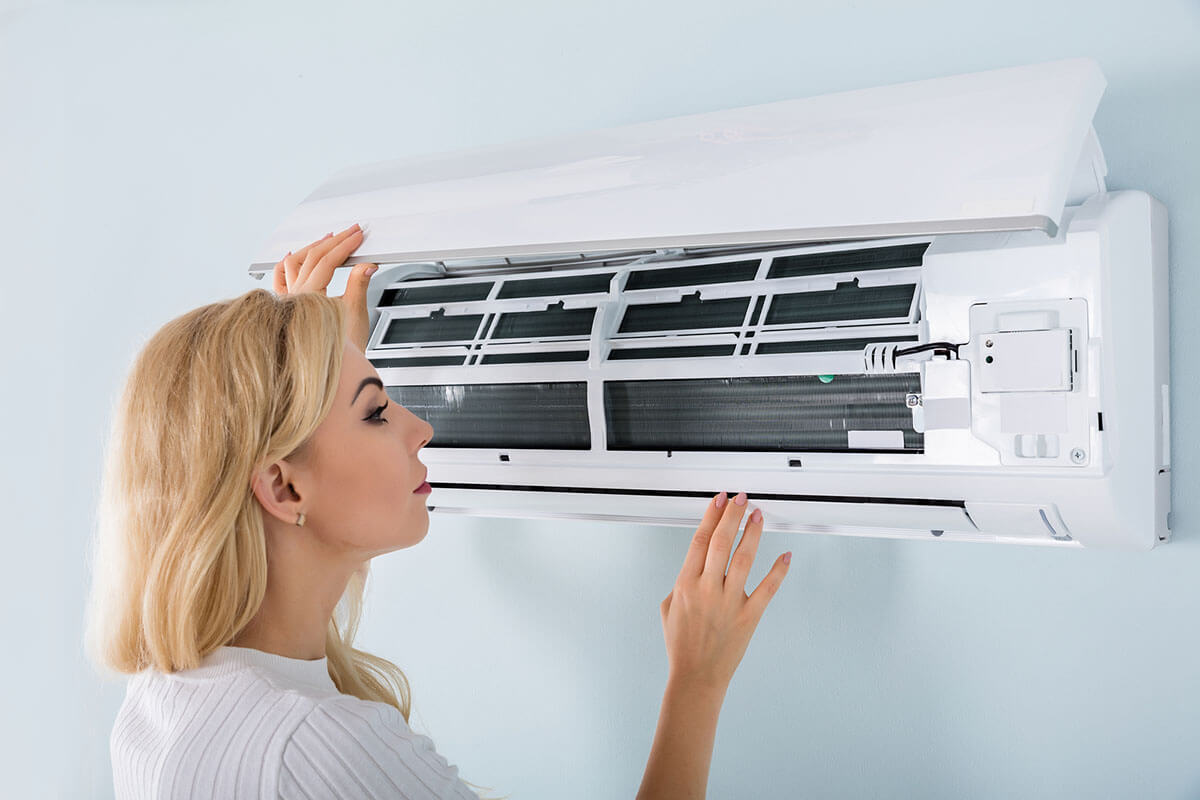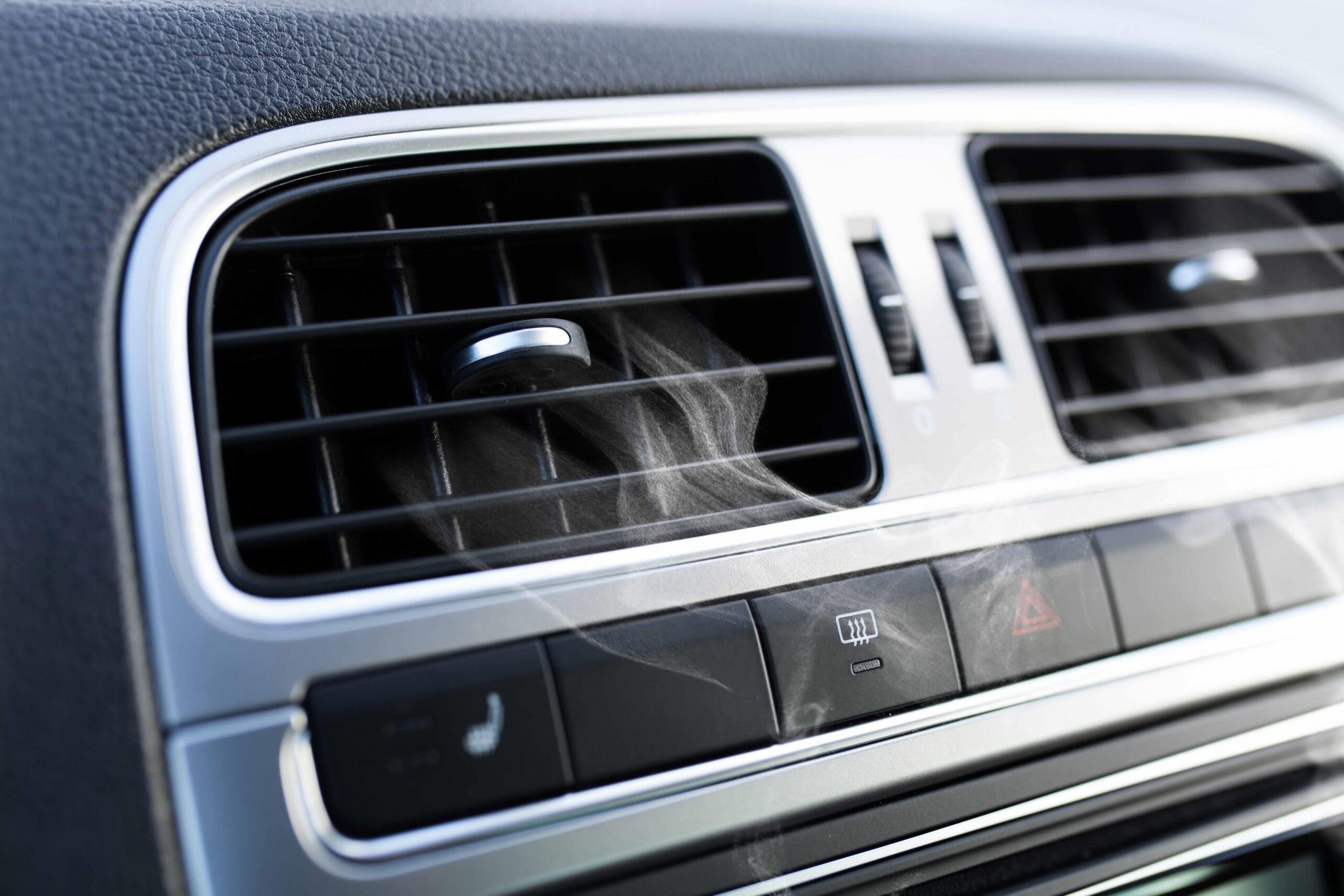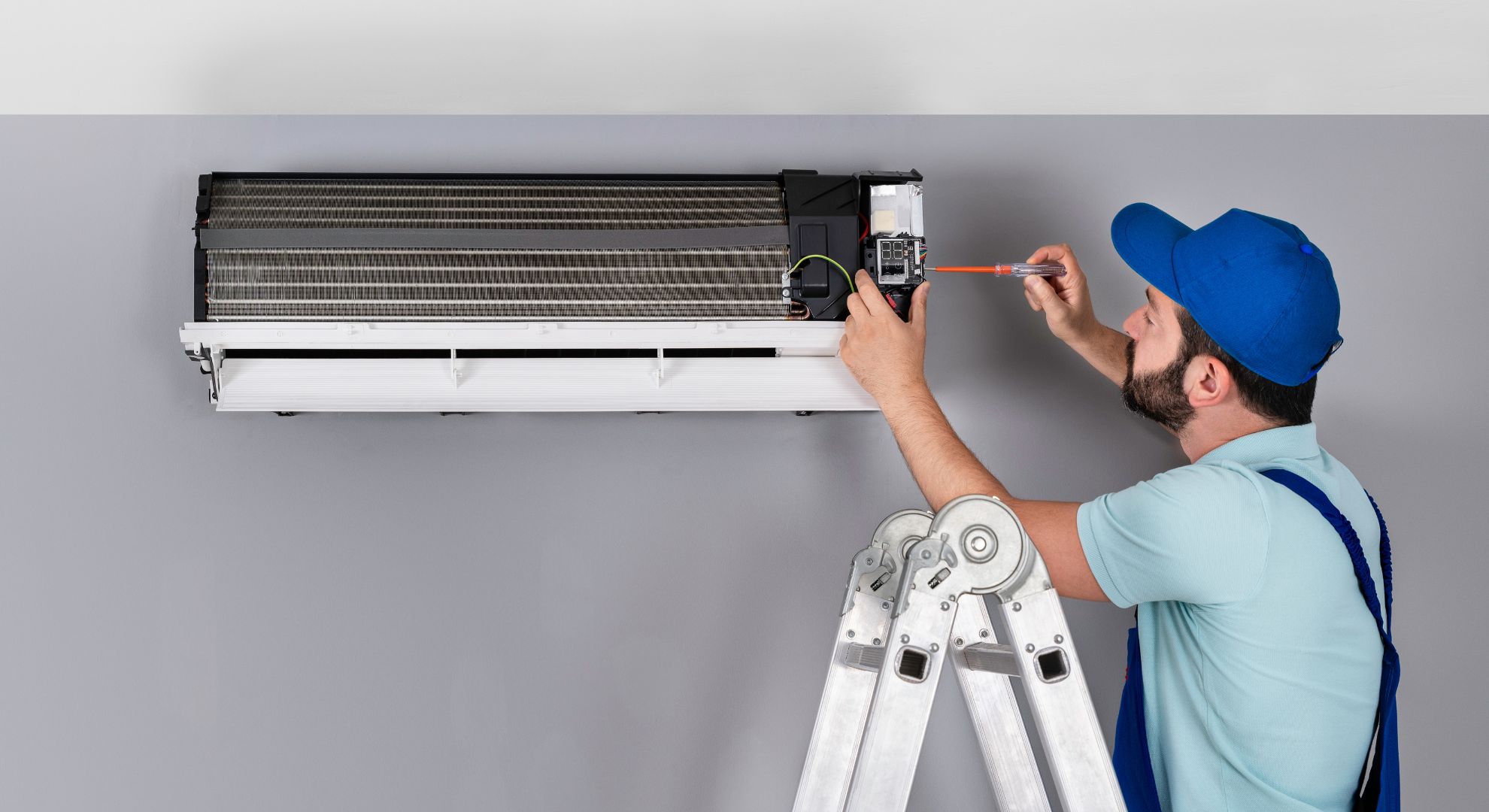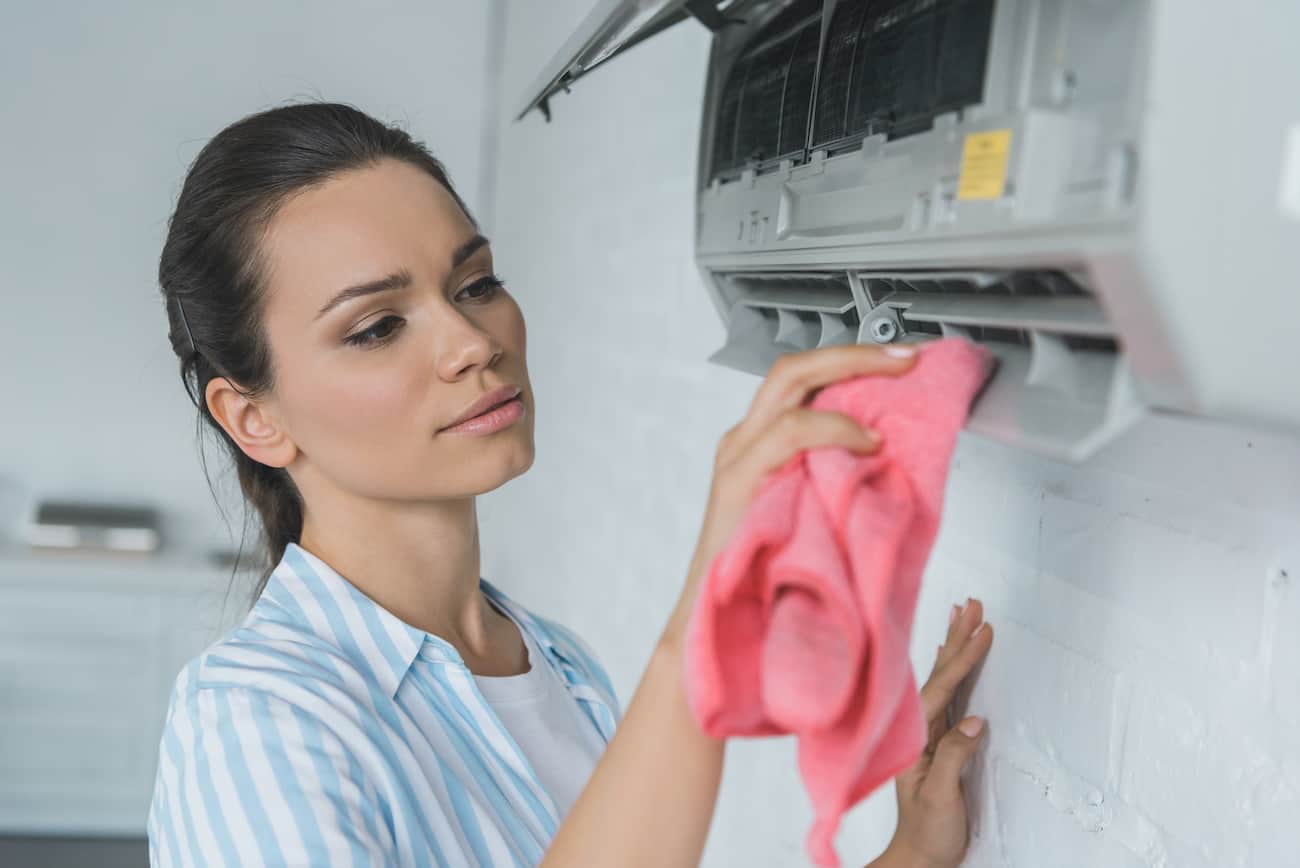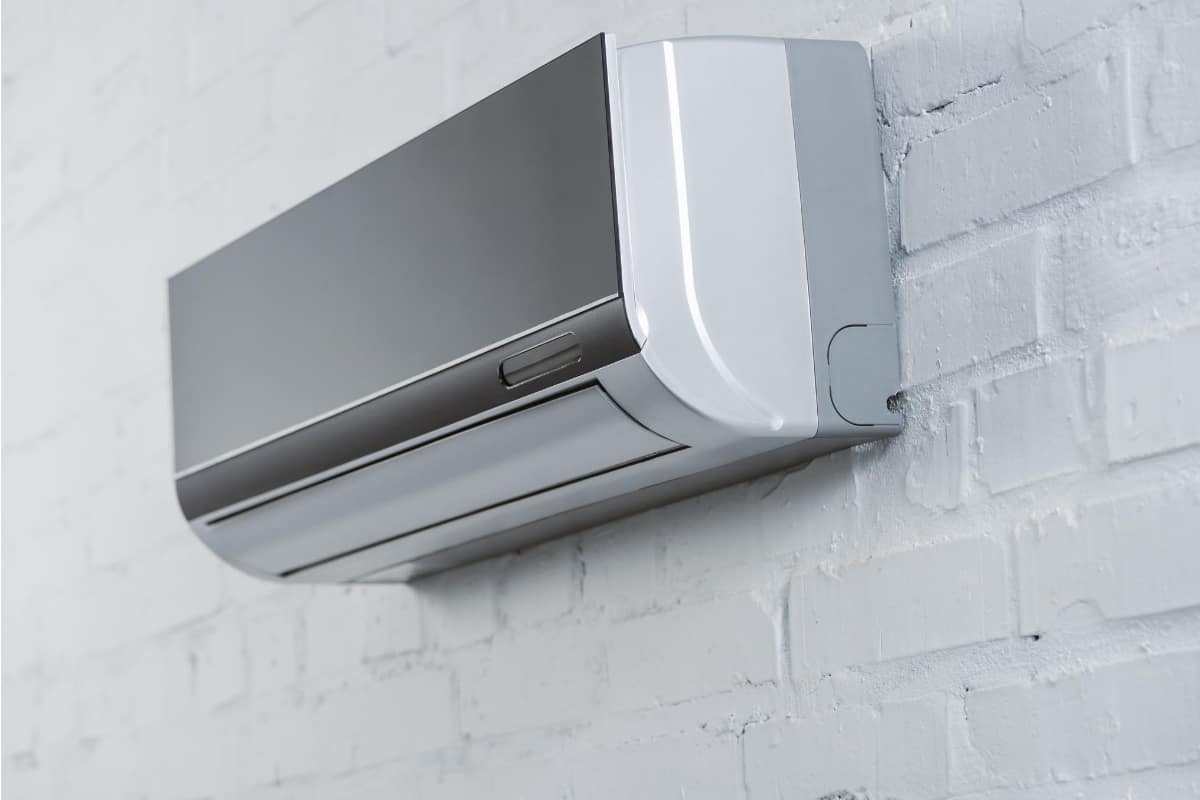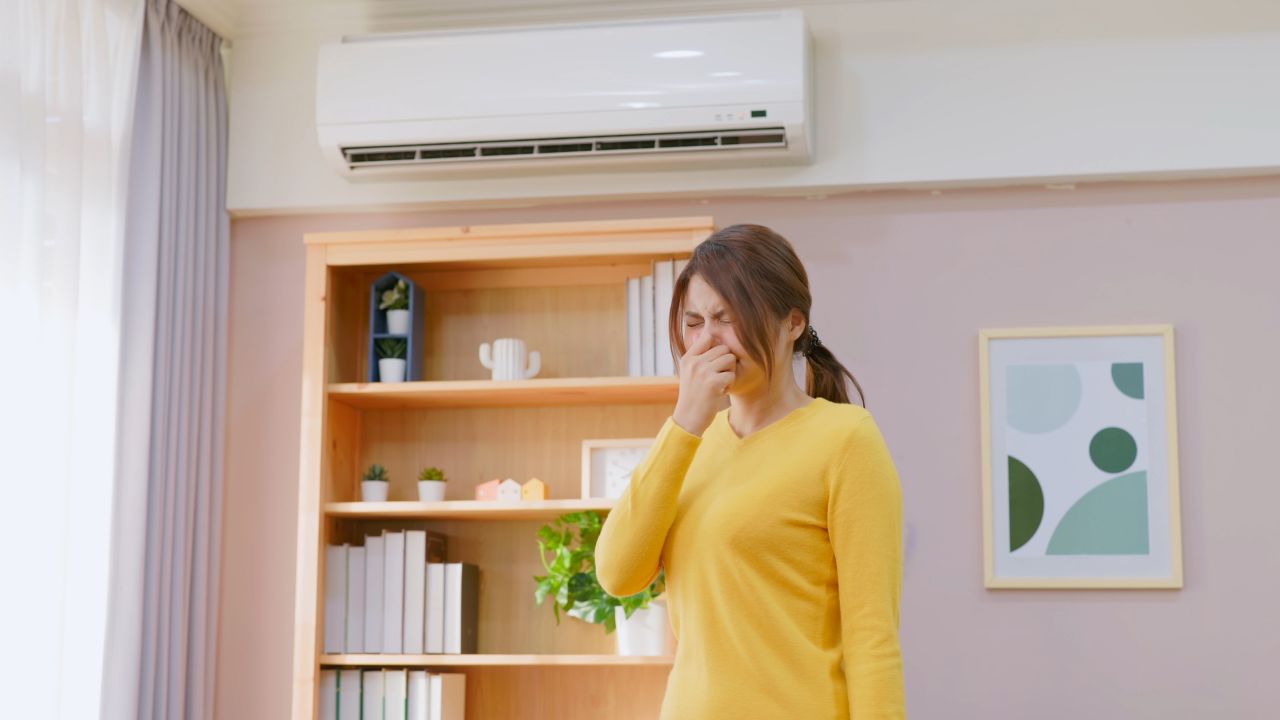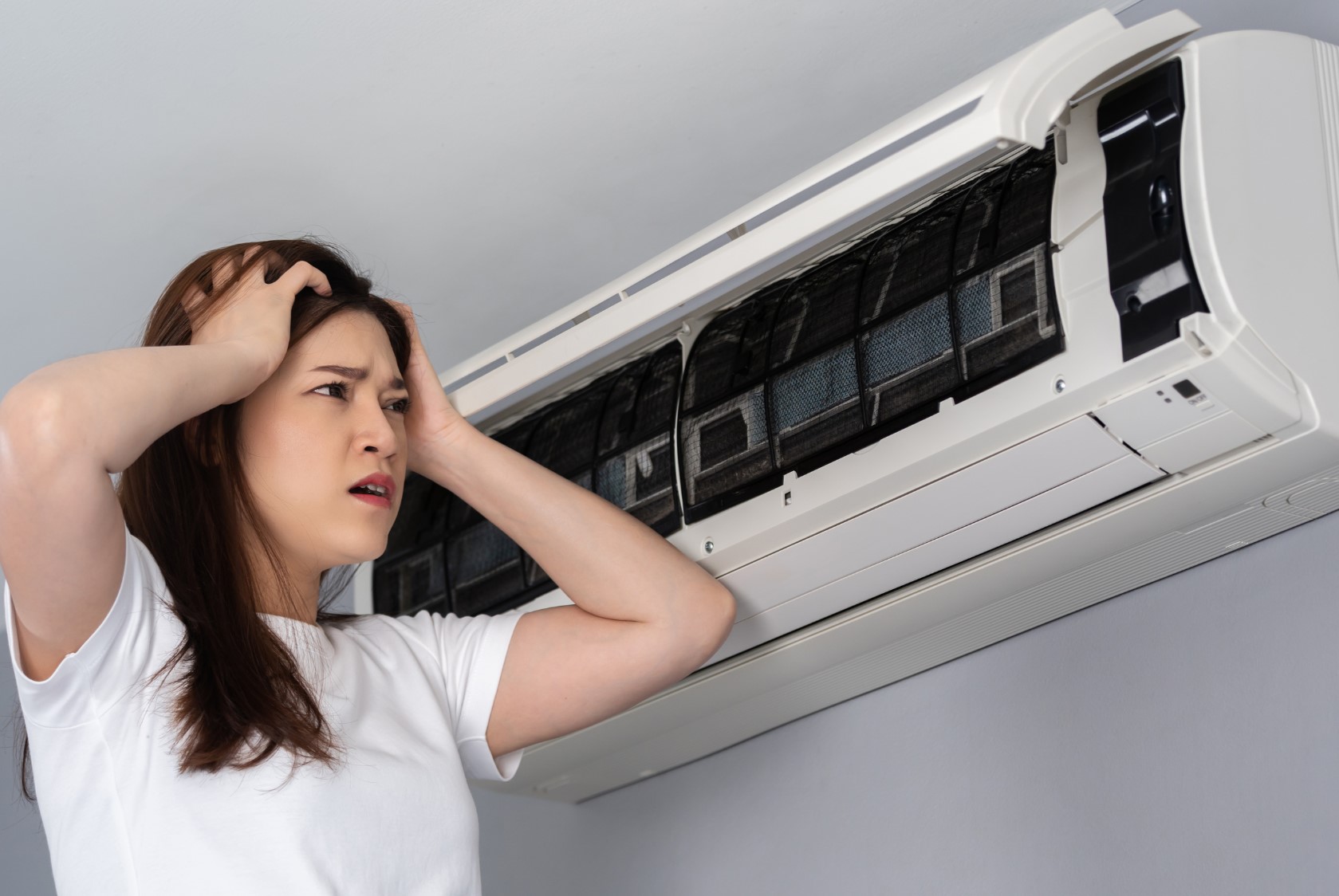Home>Home Maintenance>Why Does My Air Conditioner Smell Burnt


Home Maintenance
Why Does My Air Conditioner Smell Burnt
Modified: March 7, 2024
Get rid of that burnt smell coming from your air conditioner with our expert home maintenance solutions. Don't let the odor ruin your comfort.
(Many of the links in this article redirect to a specific reviewed product. Your purchase of these products through affiliate links helps to generate commission for Storables.com, at no extra cost. Learn more)
Introduction
Welcome to your comprehensive guide on why your air conditioner may emit a burnt smell. Imagine this: you turn on your air conditioner after a long, hot day, hoping for a refreshing blast of cool air. But instead, you’re greeted by an unpleasant, acrid odor that permeates the room. This is a frustrating and concerning situation that many homeowners have experienced.
A burnt smell coming from your air conditioner can be a sign of an underlying issue that needs to be addressed promptly. Ignoring the problem can lead to further damage and potentially compromise the efficiency and lifespan of your cooling system.
In this article, we will explore the possible causes of a burnt smell in your air conditioner and provide troubleshooting tips to help you resolve the issue. Whether you are an HVAC professional or a homeowner, this guide will equip you with the knowledge and steps necessary to tackle this problem.
Remember, if you are unsure or uncomfortable with performing any troubleshooting or maintenance on your air conditioner, it is always best to consult a qualified HVAC technician for assistance. Now, let’s dive into the potential reasons behind that concerning burnt smell!
Key Takeaways:
- Don’t ignore a burnt smell from your air conditioner! It could be caused by overheated motors, electrical issues, or clogged filters. Turn it off, inspect, and clean or replace filters to prevent further damage.
- Regular professional maintenance for your air conditioner is crucial to prevent burnt smells and ensure efficient, safe operation. Addressing issues promptly and keeping filters clean can improve air quality and system performance.
Read more: Why Does My Washer Smell Burnt
Possible Causes of a Burnt Smell in an Air Conditioner
A burnt smell in your air conditioner can stem from various sources. Identifying the cause is crucial for addressing the issue promptly and effectively. Let’s explore some of the potential reasons behind that unpleasant odor:
- 1. Overheated Motor: One of the most common causes of a burnt smell is an overheated motor. The motor in your air conditioner works hard to keep the system running smoothly. However, if the motor becomes overloaded or encounters a malfunction, it can generate excessive heat, resulting in a burnt odor.
- 2. Electrical Issue: Faulty electrical components, such as wiring or connections, can also contribute to a burnt smell. Over time, electrical connections may become loose or damaged, causing them to overheat and potentially emit a burning odor.
- 3. Clogged Air Filters or Ducts: Air filters and ducts play a vital role in maintaining good indoor air quality. However, if they become clogged with dirt, dust, or other debris, it can restrict airflow and cause the system to work harder. This increased strain on the air conditioner can lead to overheating and a burnt smell.
- 4. Accumulated Dust or Debris: Over time, dust and debris can accumulate on the internal components of your air conditioner. When the system operates, this build-up can burn and emit a noticeable odor.
- 5. Mold or Mildew Growth: If your air conditioner has a damp or humid environment, it may be prone to mold or mildew growth. These fungi can proliferate in the system and emit an unpleasant odor, similar to a burnt smell.
- 6. Burning or Melting Wires: In some cases, electrical wires within your air conditioner can become damaged, leading to burning or melting. This can occur due to overheating, rodent damage, or other factors, and result in a distinct burnt smell.
These are just a few potential causes of a burnt smell in your air conditioner. It’s essential to diagnose the issue accurately to take the appropriate steps in resolving the problem. In the following section, we will provide troubleshooting tips to help you address the burnt smell and keep your air conditioner in optimal condition.
Overheated Motor
An overheated motor is a common cause of a burnt smell in an air conditioner. The motor in your air conditioner is responsible for driving the fan and compressor, both essential components for cooling your home. When the motor becomes overloaded or encounters a malfunction, it can generate excessive heat, resulting in that unpleasant burnt odor.
There are several factors that can contribute to an overheated motor:
- Dirty or clogged air filters: When air filters become dirty or clogged, they restrict the airflow to the motor. This causes it to work harder and can lead to overheating. Regularly cleaning or replacing your air filters is crucial for the proper functioning of your air conditioner and can prevent an overheated motor.
- Lack of lubrication: The motor of your air conditioner relies on lubrication to reduce friction and heat buildup. If the motor hasn’t been properly lubricated, it can put additional strain on the components and lead to overheating. Regular maintenance, including lubricating the motor, is essential for preventing this issue.
- Faulty motor or capacitor: Over time, the motor or capacitor in your air conditioner may weaken or fail, causing the motor to work harder and overheat. A damaged motor or capacitor should be replaced by a qualified HVAC technician to prevent further damage to your cooling system.
- High outdoor temperature: When the outdoor temperature is particularly high, it can put additional stress on your air conditioner’s motor. This can cause it to work harder and overheat. Ensuring proper ventilation around the outdoor unit and shading it from direct sunlight can help mitigate this issue.
If you suspect that the burnt smell in your air conditioner is due to an overheated motor, there are a few troubleshooting steps you can take:
- 1. Turn off the air conditioner: As soon as you notice the burnt smell, turn off the air conditioner to prevent further damage. This will allow the motor to cool down and reduce the risk of overheating.
- 2. Inspect the motor: Once the system has cooled down, visually inspect the motor for any visible signs of damage, such as burnt wires or loose connections. If you notice any issues, it’s best to contact a professional HVAC technician to handle the repairs.
- 3. Schedule regular maintenance: Regular maintenance by a qualified technician can help prevent motor-related issues. They will inspect the motor, clean it, lubricate it if necessary, and ensure that all components are functioning correctly.
By addressing an overheated motor promptly, you can prevent further damage to your air conditioner and ensure that it runs smoothly and efficiently.
Electrical Issue
Faulty electrical components can also be a culprit behind the burnt smell in your air conditioner. Electrical issues can arise from various sources and should be addressed as soon as possible to prevent any potential hazards. Here are some common electrical problems that may contribute to a burnt smell:
- Loose or damaged wiring: Over time, the vibrations and movements of the air conditioning unit can loosen electrical connections. Loose wiring can lead to arcing, overheating, and eventually cause a burnt odor. Additionally, rodents or pests can chew on wires, leading to exposed or damaged electrical connections.
- Faulty Capacitor: A faulty capacitor, which is responsible for the starting and running of the motor, can cause electrical issues in your air conditioner. When a capacitor malfunctions, it can generate excess heat and emit a burnt smell. This is a critical component that should be replaced by a professional technician.
- Faulty Circuit Breaker: If your air conditioner is repeatedly tripping the circuit breaker or causing electrical disruptions, it can result in a burnt smell. This indicates an electrical overload, which may be caused by a malfunctioning air conditioning unit or an overloaded electrical circuit.
- Compressor Issues: The compressor is a crucial component of your air conditioning system. If the compressor experiences electrical problems, such as a short circuit or faulty wiring, it can lead to overheating and emit a burnt smell.
If you suspect an electrical issue as the source of the burnt smell in your air conditioner, follow these troubleshooting steps:
- Turn off the air conditioner: First and foremost, turn off the air conditioner immediately. This will help prevent any electrical damage or potential hazards.
- Inspect the electrical connections: Carefully examine the electrical connections within the unit for loose or damaged wiring. If you notice any issues, it is crucial to contact a professional HVAC technician to handle the repairs. Electrical work should be performed by a qualified technician to ensure safety.
- Check the circuit breaker: Verify if the circuit breaker associated with your air conditioner has tripped. If it has, reset the circuit breaker and observe if the issue persists. If the circuit breaker continues to trip, it may indicate a more severe electrical problem that requires professional attention.
- Consult a professional: Electrical issues can be complex and potentially dangerous. It is always best to consult a licensed HVAC technician to inspect and repair any electrical problems in your air conditioner. They have the expertise to identify and address electrical issues safely and effectively.
By addressing electrical issues swiftly, you can ensure the safe and efficient operation of your air conditioner while eliminating the burnt smell.
Clogged Air Filters or Ducts
Clogged air filters and ducts can be a common cause of a burnt smell in your air conditioner. Air filters are essential components of your cooling system, as they trap dust, dirt, and debris, preventing them from circulating through your home. However, when air filters become clogged, they restrict airflow and can cause your air conditioner to work harder, leading to overheating and a distinct burnt odor.
Similarly, clogged ducts can impede the proper airflow in your system. Over time, dust, pet dander, and other debris can accumulate in the ductwork, reducing the efficiency of your air conditioner and creating a potential breeding ground for mold, further exacerbating the issue.
Here are some steps you can take to troubleshoot and resolve clogged air filters or ducts:
- Turn off the air conditioner: As soon as you notice the burnt smell, turn off your air conditioner. This will prevent any further damage or strain on the system.
- Inspect the air filters: Locate the air filters in your air conditioning system. If they are visibly dirty or clogged, it’s time to clean or replace them. For reusable filters, follow the manufacturer’s instructions for proper cleaning. If your filters are disposable, replace them with new ones.
- Clean the ducts: If you suspect that the ducts are clogged, it may be necessary to clean them. You can use a vacuum cleaner with a brush attachment to remove any loose debris. However, for a more thorough cleaning, it is recommended to hire a professional duct cleaning service, as they have specialized equipment to clean the entire ductwork.
- Prevent future clogs: To prevent clogged air filters and ducts in the future, establish a regular maintenance routine. Clean or replace your air filters every 1-3 months, depending on usage. Additionally, schedule periodic professional duct cleaning to ensure optimal airflow and prevent debris buildup in the ductwork.
Regular maintenance and proper care of your air filters and ductwork are crucial in preventing clogs and maintaining the efficiency of your air conditioning system. By addressing clogged air filters and ducts promptly, you can eliminate the burnt smell and improve the overall air quality in your home.
Read more: Why Does My Air Conditioner Smell Musty
Accumulated Dust or Debris
Accumulated dust and debris within your air conditioner can be another cause of a burnt smell. Over time, particles such as dust, pet dander, pollen, and other airborne contaminants can settle on the internal components of your air conditioner. When the system operates, these accumulated substances can heat up and emit an unpleasant odor resembling a burnt smell.
To troubleshoot and address the issue of accumulated dust or debris, follow these steps:
- Turn off the air conditioner: As soon as you detect the burnt smell, turn off your air conditioner to prevent any further circulation of the odor and potential damage to the system.
- Clean the internal components: Open the access panels of your air conditioner and carefully inspect the internal components. Using a soft brush attachment or a can of compressed air, gently remove any visible dust or debris from the surfaces, including the evaporator coils, condenser coils, and fan blades. Be cautious not to damage any delicate parts during the cleaning process.
- Vacuum the interior: Utilize a vacuum cleaner with a brush attachment to clean the interior of your air conditioner. Take care to remove any loose dust and debris from the unit, paying attention to the corners and crevices.
- Clean the drain pan and drain line: The drain pan and drain line of your air conditioner can also accumulate debris and contribute to the burnt smell. Clean the drain pan using a mild detergent and warm water. Use a thin brush or pipe cleaner to clear out any obstructions in the drain line.
- Regular maintenance: Implement a routine maintenance schedule for your air conditioner. This includes cleaning or replacing air filters regularly, as well as scheduling professional maintenance at least once a year. Professional maintenance will involve a thorough cleaning of the internal components and ensure that the system is working efficiently.
By addressing accumulated dust and debris promptly, you can eliminate the burnt smell and improve the overall performance and longevity of your air conditioner.
Mold or Mildew Growth
Mold and mildew growth within your air conditioner can be a significant contributor to a burnt smell. If your air conditioner has a damp or humid environment, it creates an ideal breeding ground for mold and mildew. These fungi can thrive on the moist surfaces of the cooling coils, air filters, or other parts of the system. As they grow and multiply, they can emit an unpleasant odor, similar to a burnt smell.
To address mold or mildew growth and eliminate the burnt smell, follow these steps:
- Turn off the air conditioner: As soon as you notice the burnt smell, turn off your air conditioner to prevent the mold or mildew spores from spreading further.
- Inspect the system: Visually inspect the air conditioner for any signs of mold or mildew growth. Look for visible patches of mold on the cooling coils, air filters, and other components. If you suspect mold growth but cannot see it, you may need to contact a professional to perform a thorough inspection.
- Clean or replace affected components: If you find visible mold or mildew, it is important to clean or replace the affected components. Depending on the severity of the growth, you may need to clean the cooling coils, air filters, and other accessible parts with a mixture of water and mild detergent. For more extensive growth, it may be necessary to replace these components to ensure complete eradication of the mold or mildew.
- Improve ventilation and reduce humidity: To prevent future mold or mildew growth, consider enhancing the ventilation and reducing the humidity level in your home. Ensure that your air conditioner is properly sized for your space and can adequately remove excess moisture from the air. Use exhaust fans in areas prone to moisture, such as bathrooms and kitchens, and consider using a dehumidifier to maintain optimal humidity levels.
- Schedule professional mold remediation if necessary: If the mold or mildew growth is extensive or difficult to access, it is recommended to seek the assistance of professional mold remediation services. They have the expertise, equipment, and knowledge to safely and effectively remove mold, ensuring a clean and healthy air conditioning system.
By addressing mold or mildew growth and eliminating the burnt smell, you can improve the air quality within your home and maintain a healthy environment.
Burning or Melting Wires
One of the most concerning causes of a burnt smell in an air conditioner is burning or melting wires. When wires inside the unit become damaged or overloaded, they can heat up to the point of burning or melting, emitting a distinct burnt odor. This is a serious issue that requires immediate attention as it can pose a fire hazard and further damage the air conditioner.
To address the issue of burning or melting wires, follow these steps:
- Turn off the air conditioner: As soon as you detect the burnt smell, turn off the air conditioner immediately to prevent any further electrical damage or potential fire. Safety should always be the top priority when dealing with electrical issues.
- Inspect for visible damage: Carefully examine the internal components of the air conditioner for any signs of visible wire damage, such as burnt or melted wires, exposed wires, or loose connections. If you notice any issues, it is crucial to contact a professional HVAC technician as soon as possible. Attempting to repair electrical issues yourself can be dangerous and may result in further damage or injury.
- Avoid using the air conditioner: It is essential to avoid using the air conditioner until the issue with the wiring is resolved. Continuing to use the system can pose a significant risk and potentially worsen the problem.
- Contact a professional HVAC technician: Due to the complexity and potential hazards associated with electrical issues, it is highly recommended to consult a licensed HVAC technician. They have the necessary expertise to diagnose and repair the specific wiring problem in your air conditioner safely.
- Regular professional maintenance: To prevent future issues with burning or melting wires, it is crucial to schedule regular professional maintenance for your air conditioning system. During these maintenance visits, a qualified technician will inspect the electrical components, identify any potential issues, and perform necessary repairs or replacements to ensure the safe and efficient operation of your air conditioner.
Addressing burning or melting wires in your air conditioner requires immediate attention to ensure the safety of your home and prevent further damage. Always rely on the expertise of a professional HVAC technician to handle electrical issues in your cooling system.
If your air conditioner smells burnt, it could be a sign of a failing motor or electrical issue. Turn off the unit and call a professional for inspection and repair to prevent further damage.
Troubleshooting Tips to Address the Burnt Smell
Dealing with a burnt smell in your air conditioner can be concerning, but there are several troubleshooting tips you can follow to address the issue. By taking these steps, you can potentially resolve the problem or identify the underlying cause, allowing for the appropriate repairs or maintenance to be carried out. Here are some troubleshooting tips to help you tackle the burnt smell:
- 1. Turn Off the Air Conditioner: As soon as you notice the burnt smell, turn off the air conditioner. This will prevent any further circulation of the odor and potential damage to the system. Safety should always be the first priority when troubleshooting air conditioner issues.
- 2. Inspect the Unit for Visible Damage: Take a close look at the air conditioner’s components for any visible damage. Check for signs of burnt wires, loose connections, leaking refrigerant, or other abnormalities. If you notice any issues, it is best to contact a qualified HVAC technician to assess and repair the damage.
- 3. Clean or Replace Air Filters: Dirty or clogged air filters can restrict airflow, leading to overheating and the burnt smell. Remove the air filters and clean them if they are reusable or replace them if they are disposable. Cleaning or replacing the air filters regularly is essential for the proper functioning of your air conditioner.
- 4. Check for Obstructions in the Ductwork: Examine the ductwork for any obstructions that may be affecting airflow. Remove any visible debris or blockages that may be hindering the proper circulation of air. Clearing obstructions can help alleviate strain on the system and reduce the burnt smell.
- 5. Schedule Professional Maintenance: Regular professional maintenance is crucial for identifying and addressing potential issues with your air conditioner. Schedule a maintenance visit with a qualified HVAC technician who can thoroughly inspect and service your system, ensuring optimal performance and reducing the risk of a burnt smell.
Remember, it is important to exercise caution and avoid attempting complex repairs or maintenance if you are not experienced or confident in doing so. HVAC systems are intricate and require specialized knowledge to handle effectively. Consulting a professional technician is always advisable to ensure the proper resolution of the burnt smell issue.
By following these troubleshooting tips and seeking professional assistance when needed, you can address the burnt smell in your air conditioner and restore its functionality and performance.
Read more: Why Does My Hair Dryer Smell Burnt
Turn Off the Air Conditioner
When you detect a burnt smell coming from your air conditioner, the first and most important troubleshooting step is to turn off the system immediately. It’s crucial to prioritize safety and prevent any further damage or potential hazards. Shutting down the air conditioner will help minimize the risk of electrical problems or component damage.
Here are a few reasons why it’s important to turn off the air conditioner when you notice a burnt smell:
- Prevent further damage: Continuing to run the air conditioner with a burnt smell can exacerbate the issue and potentially cause more damage. By turning off the system, you can prevent any additional strain on the components and avoid potential electrical hazards.
- Reduce the risk of fire: A burnt smell is often an indication of an electrical problem, and electrical malfunctions can lead to fire hazards. Turning off the air conditioner helps minimize the risk of a fire starting within the system or spreading to other areas of your home.
- Protect your health and well-being: In some cases, a burnt smell can be associated with the release of harmful gases or chemicals. By turning off the air conditioner, you prevent these substances from circulating in your home and affecting your indoor air quality, ensuring the well-being of you and your family.
Once you have turned off the air conditioner, allow it to cool down completely before attempting any further troubleshooting. This cooling-off period will reduce the risk of burns or injuries when inspecting or addressing the burnt smell issue.
If you are unsure about turning off your air conditioner or need guidance on how to do so correctly, consult your system’s user manual or reach out to a professional HVAC technician for assistance. They can provide specific instructions based on the make and model of your air conditioner.
Keep in mind that turning off the air conditioner is the critical first step in troubleshooting a burnt smell. Once the system is off, you can proceed with the next steps to identify the cause of the issue and implement appropriate repairs or maintenance.
Inspect the Unit for Visible Damage
After turning off your air conditioner due to a burnt smell, the next step is to inspect the unit for any visible damage. By thoroughly examining the components, you can identify potential issues that may be causing the burnt smell. Here’s how to inspect the unit for visible damage:
- Open access panels: Depending on the design of your air conditioner, you may need to remove access panels to gain visibility into the internal components. Follow the manufacturer’s instructions or refer to the user manual to safely remove the panels.
- Look for burnt or melted wires: Carefully inspect the wiring inside the air conditioner for any signs of burning, melting, or charring. Burnt or melted wires can indicate an electrical problem that needs to be addressed by a professional technician. If you notice any damaged or compromised wires, avoid touching them and seek professional assistance.
- Check for loose connections: Examine the connections between wires, cables, and electrical components. Loose connections can lead to overheating and potential burning smells. Ensure that all connections are secure and tightened properly. If you find any loose connections, turn off the power supply and consult a qualified technician to fix them.
- Inspect for refrigerant leaks: Scan the air conditioner for any signs of refrigerant leakage. A burnt smell accompanied by a chemical odor may indicate a refrigerant leak. Look for oily or greasy spots on the components or surrounding areas as a possible indication of a refrigerant leak. If you suspect a refrigerant leak, it is essential to contact an HVAC professional to address the issue, as handling refrigerant requires specialized training and equipment.
- Check for other visible damage: Take a close look at the various components of the air conditioner, including the fan blades, coils, and housing. Look for signs of damage, such as corrosion, cracks, or physical deformities. Damaged components can compromise the performance and safety of the system and could be contributing to the burnt smell.
During your inspection, ensure that the air conditioner is completely powered off and there is no risk of electric shock. If you are unsure or uncomfortable with performing the inspection, it is best to consult a professional HVAC technician who can assess the unit for visible damage and provide appropriate recommendations for repairs or replacements.
By inspecting the unit for visible damage, you can gather valuable information about the possible causes of the burnt smell. This will help guide the next steps in troubleshooting and addressing the issue effectively.
Clean or Replace Air Filters
When dealing with a burnt smell in your air conditioner, one of the troubleshooting steps is to clean or replace the air filters. Dirty or clogged air filters can restrict airflow, leading to overheating and the emission of a burnt odor. Here’s how to clean or replace your air filters:
- Locate the air filters: Depending on your air conditioning system, the filters can be found in different locations. Common locations include the return air grille, inside the air handler unit, or in the ceiling or wall duct vents. Consult your air conditioner’s user manual if you’re having trouble locating the filters.
- Check the condition of the filters: Remove the filters and inspect them for dirt, dust, and debris. If they are visibly dirty or clogged, it’s time to clean or replace them. In some cases, filters may be disposable and need to be replaced, while others may be reusable and can be cleaned.
- Clean reusable filters: If you have reusable filters, rinse them under running water to remove loose debris and dirt. For more stubborn dirt, you can use a mild detergent or follow the manufacturer’s instructions for cleaning. Allow the filters to dry completely before reinstalling them.
- Replace disposable filters: If your air filters are disposable, simply discard them and replace them with new ones. Make sure to choose filters that are compatible with your air conditioning system and follow the instructions for proper installation.
- Establish a regular maintenance schedule: To prevent future issues with dirty air filters, establish a regular maintenance schedule. Typically, air filters should be cleaned or replaced every 1-3 months, depending on usage and the manufacturer’s recommendations. Regular maintenance will ensure proper airflow, minimize strain on the system, and reduce the likelihood of a burnt smell.
Cleaning or replacing air filters is an essential maintenance task that helps keep your air conditioner running efficiently and reduces the chances of a burnt smell. Additionally, clean filters can improve indoor air quality by trapping dust, allergens, and other particles.
If you’re unsure about the type of filters to use or how to properly clean or replace them, consult your air conditioner’s user manual or contact a professional HVAC technician for guidance. They can provide expert advice tailored to your specific system and ensure that you perform the maintenance correctly.
By regularly cleaning or replacing air filters, you can maintain optimal airflow, improve energy efficiency, and reduce the risk of a burnt smell in your air conditioner.
Check for Obstructions in the Ductwork
One of the troubleshooting steps to address a burnt smell in your air conditioner is to check for obstructions in the ductwork. Blockages or obstructions can restrict airflow and cause the system to work harder, leading to overheating and the emission of a burnt odor. Follow these steps to check for obstructions in the ductwork:
- Locate the air registers: The air registers are the vents or grilles that air flows through into the rooms of your home. Take note of their locations throughout your house.
- Inspect the registers: Visually inspect the registers for any visible signs of blockage or obstruction. Look for dust buildup, debris, or objects that may be obstructing the airflow. Use a flashlight if necessary to get a better view.
- Remove obstructions: If you see any visible obstructions, carefully remove them. This can include items like toys, furniture blocking the registers, or debris buildup. Ensure that the registers are clear and allow for unobstructed airflow.
- Check the ductwork: Examine the exposed sections of the ductwork, if accessible, for any visible signs of blockage or damage. Look for loose insulation, collapsed sections, or foreign objects that may be obstructing the ducts.
- Schedule professional duct cleaning: If you suspect that the ductwork may be heavily obstructed or contaminated, it is recommended to schedule professional duct cleaning. Professional technicians have specialized tools and equipment to thoroughly clean the ducts, removing any build-up, dust, or debris that may contribute to the blocked airflow and burnt smell.
Checking for obstructions in the ductwork helps ensure that the airflow within your air conditioner is not impeded, reducing the risk of overheating and the associated burnt smell. Additionally, unobstructed ducts improve the overall efficiency and performance of your cooling system.
If you have difficulty accessing or clearing obstructions in the ductwork, or if you suspect significant blockage or damage within the ducts, it’s best to consult with a professional HVAC technician. They have the expertise and necessary tools to thoroughly inspect and address any issues within the ductwork.
By regularly checking for obstructions in the ductwork and ensuring unimpeded airflow, you can help maintain the proper functioning of your air conditioner and reduce the likelihood of a burnt smell.
Read more: Why Does My Space Heater Smell Burnt
Schedule Professional Maintenance
To address the burnt smell in your air conditioner and ensure its optimal performance, it is highly recommended to schedule professional maintenance. Professional maintenance involves a thorough inspection, cleaning, and servicing of your air conditioning system by an experienced HVAC technician. Here’s why professional maintenance is essential:
- Comprehensive system inspection: A professional technician will conduct a detailed inspection of your air conditioner, including all components, wiring, and electrical connections. They can identify any potential issues that may be causing the burnt smell or could lead to future problems.
- Cleaning of internal components: The technician will clean the internal components of your air conditioner, including the coils, fan blades, and other essential parts. Removing dust, debris, and accumulated dirt helps optimize the system’s performance and reduces the risk of a burnt smell.
- Lubrication of moving parts: Proper lubrication is crucial for the efficient operation of your air conditioner. During professional maintenance, the technician will ensure that all moving parts are properly lubricated to minimize friction and prevent overheating.
- Identifying and resolving issues: If the technician detects any underlying issues during the maintenance visit, they can provide recommendations for repairs or replacements. Addressing these issues promptly can prevent further damage to the system and eliminate the burnt smell altogether.
- Maximizing energy efficiency: Professional maintenance helps optimize the energy efficiency of your air conditioner. By cleaning and servicing the system, it can operate at its peak performance, reducing energy consumption, and potentially lowering your utility bills.
Scheduling professional maintenance at least once a year is recommended to ensure the continued performance and longevity of your air conditioner. However, you may consider more frequent maintenance visits if you live in a particularly dusty or humid environment or if you have noticed persistent issues with your system.
Remember, professional maintenance should be performed by a certified HVAC technician with the necessary expertise and qualifications. They have the knowledge to identify and address issues specific to your air conditioner, ensuring that it operates safely and efficiently.
By scheduling regular professional maintenance, you can proactively address any potential problems, improve the performance of your air conditioner, and minimize the occurrence of a burnt smell.
Conclusion
Experiencing a burnt smell in your air conditioner can be a cause for concern, but by following the troubleshooting tips outlined in this article, you can identify and address the underlying causes. Remember these key points:
First, turn off your air conditioner as soon as you detect the burnt smell to prevent further damage and potential hazards. Then, inspect the unit for visible damage such as burnt wires or loose connections, and take appropriate action or seek professional assistance if needed.
Next, clean or replace the air filters, as dirty or clogged filters can restrict airflow and contribute to overheating and a burnt smell. Additionally, check for obstructions in the ductwork and remove any blockages to ensure unobstructed airflow and proper system operation.
If you encounter mold or mildew growth in your air conditioner, address it promptly to eliminate the burnt smell and maintain a healthy indoor environment. Finally, consider scheduling professional maintenance at least once a year to ensure the efficient and reliable operation of your air conditioner and prevent future issues.
It’s important to note that while DIY troubleshooting can be helpful, HVAC systems can be complex, and safety should always be a top priority. If you are unsure or uncomfortable with any troubleshooting steps, it is recommended to consult a qualified HVAC technician for assistance.
By following these troubleshooting tips, addressing the specific causes of the burnt smell, and maintaining regular maintenance, you can keep your air conditioner running smoothly, efficiently, and free from any unpleasant odors.
Remember, a well-maintained air conditioner not only creates a comfortable and enjoyable indoor environment but also contributes to your overall well-being and quality of life.
Frequently Asked Questions about Why Does My Air Conditioner Smell Burnt
Was this page helpful?
At Storables.com, we guarantee accurate and reliable information. Our content, validated by Expert Board Contributors, is crafted following stringent Editorial Policies. We're committed to providing you with well-researched, expert-backed insights for all your informational needs.
